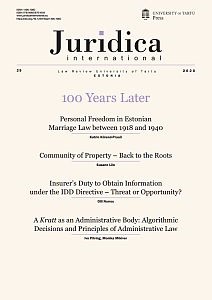The Ombudsman in the Eyes of the European Court of Human Rights
DOI:
https://doi.org/10.12697/JI.2020.29.09Keywords:
Ombudsman, European Ombudsman, European Court of Human Rights, effective remedy (Article 13 and Article 35, §1 ECHR), Ombudsman as third party / amicus curiae, Ombudsman and guarantees of fair trial (Article 6 ECHR), independence and impartiality of Ombudsmen, proceedings before Ombudsmen and ECtHR case law, margin of appreciation and Ombudsmen, references to findings of Ombudsmen in ECtHR judgments, human rights cultureAbstract
While the work of an Ombudsman (whether a national or the European Ombudsman) and the European Court of Human Rights might seem relatively different, the rule of law, democracy, transparency and access to documents, issues such as migration, and many more fundamental rights-related topics are at the focus of both institutions. The common goal for both, Ombudsmen in Europe and the Court, is to guarantee flawless protection of human rights. The article, via a thus-far unique closer look at the ECtHR case law related to Ombudsmen with regard to institutional, procedural, and substantial issues, examines how Ombudsmen and the Court can contribute, in co-operation with each other, to more effectively serving that common goal.
Beyond the particularities of each specific case, the jurisprudence of the ECtHR does not consider the Ombudsman institution to be an effective remedy in general within the meaning of Article 35, §1 ECHR. Neither does a complaint to the Ombudsman usually constitute an effective remedy for the purposes of Article 13 ECHR, except in certain exceptional scenarios of fact wherein judicial remedies are unavailable.
There may one day be a necessity to accept the Ombudsman as an applicant in a case before the ECtHR on behalf of the victim of a human rights violation. It would be welcomed to encourage Ombudsmen to intervene as a third party before the Court. The Ombudsman can in certain situations go further and make human-rights-friendly interpretations even if the situation does not in itself represent a violation of the minimum standards set by the ECHR.
The conditions for a fair trial as stated in Article 6 ECHR and the case law of the ECtHR are applicable to the procedure before the Ombudsman if the latter determines the applicant’s civil rights and obligations, including (to a certain extent) dealing with administrative cases as covered by the case law of the ECtHR under Article 6 ECHR, and possibly in cases in which the Ombudsman could in some way determine criminal charges.
On one hand, Ombudsmen use the case law of the ECtHR in their work and play an important role in enforcing the principles of the ECtHR judgments in practice. On the other hand, the ECtHR uses the work done by Ombudsmen in its judgments. References to findings of Ombudsmen are made (although mostly in the facts part, on a few occasions also under the findings in the judgments of the Court). In these cases, the Court is indirectly giving the Ombudsman’s work legal value. Ombudsmen should be not only a bridge between citizens and administration but also an intermediary between citizens and other human rights protection bodies in Europe. It is vital to strengthen the dialogue between the Ombudsmen and the ECtHR.
Human rights are not a luxury, and the independence of Ombudsmen and courts is not their privilege but serves those who are searching for justice. Neither should one forget the ‘middle class’: the ordinary people who need protection, not only the weak and those belonging to minority groups. It is important that Ombudsmen and the Court also contribute to the development of human rights culture and raise human rights awareness.


